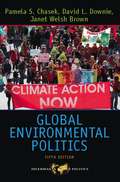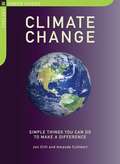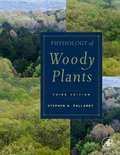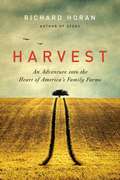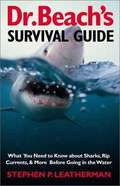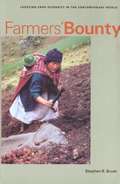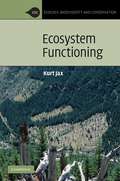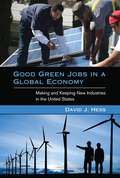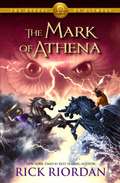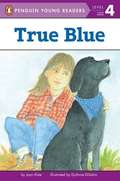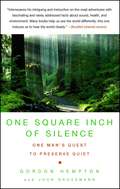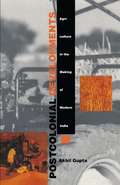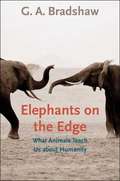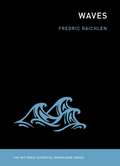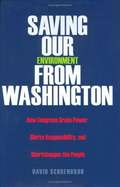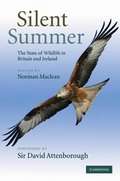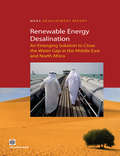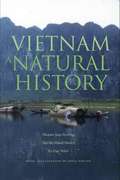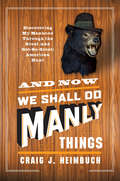- Table View
- List View
Global Environmental Politics
by Pamela S. Chasek David L. Downie Janet Welsh BrownWhenGlobal Environmental Politicswas first published, the environment was just emerging as a pivotal issue in traditional international relations. Today, the environment is considered to be a central topic to discussions of international politics, political economy, international organization, and the relationship between foreign and domestic policy. With new and updated case studies throughout, a revised chapter on improving compliance with international environmental regimes, and a new section on environment within the larger context of sustainable development, this classic text is more complete and up-to-date than any survey of international environmental politics on the market. In addition to providing a concise yet comprehensive overview of global environmental issues, the authors have worked to contextualize key topics such as the 2002 World Summit on Sustainable Development, the Kyoto Protocol, the Stockholm Convention on Persistent Organic Pollutants, international forest policy, and the trade, development and environment nexus. Environmental concerns from global warming to biodiversity loss to whaling are seen as challenges to transnational relations, with governments, NGOs, IGOs, and MNCs all involved in the multilateral interaction that is necessary to address the ever-complicated subject of global environmental politics.
Climate Change
by Jon Clift Amanda CuthbertYou know that the ice caps are melting, the seasons are changing, sea levels are rising, storms are on the increase, but what can you do about it? Plenty! This book puts the power back into your hands in the face of the doom and gloom of climate change. You don't have to wait for someone else to sort it out; rather than worry and feel helpless, you can get up and do something. "Climate Change: Simple Things You Can Do to Make a Difference" is packed with ideas for action, from simple everyday things that cost nothing to bigger projects that involve more time and money. For example: Get on your bike bull; Buy local food bull; Turn off your TV bull; Insulate your attic bull; Recycle and compost bull; Take the train bull; Turn down the heat bull; Install solar panels Do your part and protect the planet for today and tomorrow.
Circle of Three #9: Through the Veil
by Isobel BirdAs the year comes to an ending, in the hour'tween old and new, part the veil and let pass the spirits who would travel through. As Annie, Kate, and Cooper prepare for Samhain, or Halloween, they are filled with anticipation. It is a time when the veil between the worlds is thin, and those who have passed into the spirit world may be more easily contacted. Those Annie holds dear dwell behind this veil already-will she find them on this eve of Wiccan celebration?
Physiology of Woody Plants (3rd Edition)
by Stephen G. PallardyWoody plants such as trees have a significant economic and climatic influence on global economies and ecologies. This completely revised classic book is an up-to-date synthesis of the intensive research devoted to woody plants published in the second edition, with additional important aspects from the authors' previous book, Growth Control in Woody Plants. Intended primarily as a reference for researchers, the interdisciplinary nature of the book makes it useful to a broad range of scientists and researchers from agroforesters, agronomists, and arborists to plant pathologists and soil scientists. This third edition provides crutial updates to many chapters, including: responses of plants to elevated CO2; the process and regulation of cambial growth; photoinhibition and photoprotection of photosynthesis; nitrogen metabolism and internal recycling, and more. Revised chapters focus on emerging discoveries of the patterns and processes of woody plant physiology. * The only book to provide recommendations for the use of specific management practices and experimental procedures and equipment * Interdisciplinary approach will appeal to a broad range of scientists, researchers, and growers * Thoroughly updated with the latest research devoted to woody plants
Harvest: An Adventure into the Heart of America's Family Farms
by Richard HoranIn Seeds, novelist and nature writer Richard Horan sought out the trees that inspired the work of great American writers like Faulkner, Kerouac, Welty, Wharton, and Harper Lee. In Harvest, Horan embarks upon a serendipitous journey across America to work the harvests of more than a dozen essential or unusual food crops--and, in the process, forms powerful connections with the farmers, the soil, and the seasons.
Dr. Beach's Survival Guide: What You Need to Know about Sharks, Rip Currents, and More Before Going in the Water
by Stephen P. LeathermanHere, from the nation's most renowned beach expert, is the first complete guide to beach safety. Stephen P. Leatherman (a. k. a. Dr. Beach) introduces the gamut of beach hazards - from sharks to rip currents to jellyfish - revealing which dangers should be of greatest concern and how best to minimize their risks. His scientifically sound advice, interspersed with fascinating facts and anecdotes, makes this book a perfect reference for the millions of travelers and vacationers who visit the ocean shore every year. --BOOK JACKET. Title Summary field provided by Blackwell North America, Inc. All Rights Reserved
Farmers' Bounty: Locating Crop Diversity in the Contemporary World
by Stephen B. BrushOver the course of generations, pre-industrial human agriculture left a bounty of crop diversity across the earth. Bringing together a quarter century of research on the subject and his own field work in the Peruvian Andes, Mexico, and Turkey, Brush (agricultural and environmental science, U. of California at Davis) investigates questions related to patterns of agricultural crop diversity, the impact of farming changes such as industrialization, and methods of conserving diversity. He looks at the questions through lenses of evolutionary science and anthropological ethnobiology. Central to the discussion is the notion of genetic erosion, and Brush discusses both likely causes and possible policy solutions. Annotation ©2004 Book News, Inc. , Portland, OR (booknews. com)
Ecosystem Functioning
by Kurt JaxIn the face of decreasing biodiversity and ongoing global changes, maintaining ecosystem functioning is seen both as a means to preserve biological diversity as well as for safeguarding human well-being by securing the services ecosystems provide. The concept today is prominent in many fields of ecology and conservation biology, such as biodiversity research, ecosystem management, or restoration ecology. Although the idea of ecosystem functioning is important, the concept itself remains rather vague and elusive. This book provides a novel analysis and integrated synthesis of different approaches to conceptualising and assessing ecosystem functioning. It links the natural sciences with methodologies from philosophy and the social sciences, and introduces a new methodology for a clearer and more efficient application of ecosystem functioning concepts in practice. Special emphasis is laid on the social dimensions of the concept and the ways it influences research practice. Several case studies relate theoretical analyses to practical application.
Good Green Jobs in a Global Economy
by David J. HessGood Green Jobs in a Global Economy is the first book to explore the broad implications of the convergence of industrial and environnmental policy in the United States. Under the banner of "green jobs," clean energy industries and labor, environmental, and antipoverty organizations have forged "blue-green" alliances and achieved some policy victories, most notably at the state and local levels. In this book, David Hess explores the politics of green energy and green jobs, linking the prospect of a green transition to tectonic shifts in the global economy. He argues that the relative decline in U. S. economic power sets the stage for an ideological shift, away from neoliberalism and toward "developmentalism," an ideology characterized by a more defensive posture with respect to trade and a more active industrial policy. After describing federal green energy initiatives in the first two years of the Obama administration, Hess turns his attention to the state and local levels, examining demand-side and supply-side support for green industry and local small business. He analyzes the successes and failures of green coalitions and the partisan patterns of support for green energy reform. This new piecemeal green industrial policy, Hess argues, signals a fundamental challenge to anti-interventionist beliefs about the relationship between the government and the economy.
The Mark of Athena (The Heroes of Olympus #3)
by Rick RiordanThe Greek and Roman demigods will have to cooperate in order to defeat the giants released by the Earth Mother, Gaea. Then they will have to sail together to the ancient land--Greece itself--to find the Doors of Death.
Managing the Risks of Extreme Events and Disasters to Advance Climate Change Adaptation
by Christopher B. Field Vicente Barros Thomas F. Stocker Qin DaheThis Intergovernmental Panel on Climate Change Special Report (IPCC-SREX) explores the challenge of understanding and managing the risks of climate extremes to advance climate change adaptation. Extreme weather and climate events, interacting with exposed and vulnerable human and natural systems, can lead to disasters. Changes in the frequency and severity of the physical events affect disaster risk, but so do the spatially diverse and temporally dynamic patterns of exposure and vulnerability. Some types of extreme weather and climate events have increased in frequency or magnitude, but populations and assets at risk have also increased, with consequences for disaster risk. Opportunities for managing risks of weather- and climate-related disasters exist or can be developed at any scale, local to international. Prepared following strict IPCC procedures, SREX is an invaluable assessment for anyone interested in climate extremes, environmental disasters and adaptation to climate change, including policymakers, the private sector and academic researchers.
True Blue
by Joan ElsteBlue has a very sharp nose. He can smell trouble from a mile away. But now Blue has disappeared and might be in trouble himself! Blue will have to be very brave if he wants to make it home to his owner, J. D.
One Square Inch of Silence
by John Grossmann Gordon HemptonIn the visionary tradition of Rachel Carson's Silent Spring, One Square Inch of Silence alerts us to beauty that we take for granted and sounds an urgent environmental alarm. Natural silence is our nation's fastest-disappearing resource, warns Emmy-winning acoustic ecologist Gordon Hempton, who has made it his mission to record and preserve it in all its variety--before these soul-soothing terrestrial soundscapes vanish completely in the ever-rising din of man-made noise. Recalling the great works on nature written by John Muir, John McPhee, and Peter Matthiessen, this beautifully written narrative, co-authored with John Grossmann, is also a quintessentially American story--a road trip across the continent from west to east in a 1964 VW bus. But no one has crossed America like this. Armed with his recording equipment and a decibel-measuring sound-level meter, Hempton bends an inquisitive and loving ear to the varied natural voices of the American landscape--bugling elk, trilling thrushes, and drumming, endangered prairie chickens. He is an equally patient and perceptive listener when talking with people he meets on his journey about the importance of quiet in their lives. By the time he reaches his destination, Washington, D.C., where he meets with federal officials to press his case for natural silence preservation, Hempton has produced a historic and unforgettable sonic record of America. With the incisiveness of Jack Kerouac's observations on the road and the stirring wisdom of Robert Pirsig repairing an aging vehicle and his life, One Square Inch of Silence provides a moving call to action. More than simply a book, it is an actual place, too, located in one of America's last naturally quiet places, in Olympic National Park in Washington State.
Living in a Dangerous Climate
by Renée HetheringtonLiving in a Dangerous Climate provides a journey through human and Earth history, showing how a changing climate has affected human evolution and society. Is it possible for humanity to evolve quickly, or is slow, gradual, genetic evolution the only way we change? Why did all other Homo species go extinct while Homo sapiens became dominant? How did agriculture, domestication, and the use of fossil fuels affect humanity's growing dominance? Do today's dominant societies - devoted as they are to Darwinism and "survival of the fittest" - contribute to our current failure to meet the hazards of a dangerous climate? Unique and thought provoking, the book links scientific knowledge and perspectives of evolution, climate change, and economics in a way that is accessible and exciting for the general reader. The book is also valuable for courses on climate change, human evolution, and environmental science.
Climate Change Liability
by Richard Lord Silke Goldberg Lavanya Rajamani Jutta BrunnéeAs frustration mounts in some quarters at the perceived inadequacy or speed of international action on climate change, and as the likelihood of significant impacts grows, the focus is increasingly turning to liability for climate change damage. Actual or potential climate change liability implicates a growing range of actors, including governments, industry, businesses, non-governmental organisations, individuals and legal practitioners. Climate Change Liability provides an objective, rigorous and accessible overview of the existing law and the direction it might take in seventeen developed and developing countries and the European Union. In some jurisdictions, the applicable law is less developed and less the subject of current debate. In others, actions for various kinds of climate change liability have already been brought, including high profile cases such as Massachusetts v. EPA in the United States. Each chapter explores the potential for and barriers to climate change liability in private and public law.
Postcolonial Developments: Agriculture in the Making of Modern India
by Akhil GuptaThis definitive study brings together recent critiques of development and work in postcolonial studies to explore what the postcolonial condition has meant to rural people in the Third World. Focusing on local-level agricultural practices in India since the "green revolution" of the 1960s, Akhil Gupta challenges the dichotomy of "developed" and "underdeveloped," as well as the notion of a monolithic postcolonial condition. In so doing, he advances discussions of modernity in the Third World and offers a new model for future ethnographic scholarship. Based on fieldwork done in the village of Alipur in rural north India from the early 1980s through the 1990s, Postcolonial Developments examines development itself as a post-World War II sociopolitical ideological formation, critiques related policies, and explores the various uses of the concept of the "indigenous" in several discursive contexts. Gupta begins with an analysis of the connections and conflicts between the world food economy, transnational capital, and technological innovations in wheat production. He then examines narratives of village politics in Alipur to show how certain discourses influenced governmental policies on the green revolution. Drawing links between village life, national trends, and global forces, Gupta concludes with a discussion of the implications of environmentalism as exemplified by the Rio Earth Summit and an examination of how global environmental treaties may detrimentally affect the lives of subaltern peoples. With a series of subtle observations on rural politics, nationalism, gender, modernization, and difference, this innovative study capitalizes on many different disciplines: anthropology, sociology, comparative politics, cultural geography, ecology, political science, agricultural economics, and history.
Elephants on the Edge: What Animals Teach Us about Humanity
by G. A. BradshawDrawing on accounts from India to Africa and California to Tennessee, and on research in neuroscience, psychology, and animal behavior, the author explores the minds, emotions, and lives of elephants.
Twilight of the Machines
by John ZerzanThe mentor of the green anarchist and neo-primitive movements is back with his first book in six years, confronting civilisation, mass society, modernity and technoculture - both the history of its developing crisis and the possibilities for its human and humane solutions. As John Zerzan writes, 'These dire times may yet reveal invigorating new vistas of thought and action. When everything is at stake, all must be confronted and superseded. At this moment, there is the distinct possibility of doing just that. '
Waves
by Fredric RaichlenSitting on the beach on a sunny summer day, we enjoy the steady advance and retreat of the waves. In the water, enthusiastic waders jump and shriek with pleasure when a wave hits them. But where do these waves come from? How are they formed and why do they break on the shore? In Waves, Fredric Raichlen traces the evolution of waves, from their generation in the deep ocean to their effects on the coast. He explains, in a way that is readily understandable to nonscientists, both the science of waves themselves and the technology that can be used to protect us against their more extreme forms, including hurricanes and tsunamis. After offering a basic definition of waves and explaining the mechanics of wind-wave generation, Raichlen describes how waves travel, how they shoal (rise), how they break, and how they transform in other ways. He goes on to describe, among other things, the complicated sun-Earth-moon combinations that create astronomical tides (the high and low tides that occur daily and predictably); the effects of waves on the beach, including rip currents and beach erosion, and on harbors and shipping; and the building of breakwaters to protect harbors and bays. He discusses hurricanes, storm surges, and hurricane-generated waves. He offers a brief history of tsunamis, including Sumatra's in 2004 and Japan's in 2011, and explains the mechanisms that generate them (including earthquakes, landslides, and volcanoes). Waves can be little ripples that lap peacefully at the shore or monstrous tsunamis that destroy everything in their paths. Describing the science underlying this astonishing variety, Waves offers a different kind of beach reading.
Saving Our Environment from Washington: How Congress Grabs Power, Shirks Responsibility, and Shortchanges the People
by David SchoenbrodCongress empowered the Environmental Protection Agency on the theory that only a national agency that is insulated from accountability to voters could produce the scientifically grounded pollution rules needed to save a careless public from its own filth. In this provocative book, David Schoenbrod explains how his experience as an environmental advocate brought him to this startling realization: letting EPA dictate to the nation is a mistake. Through a series of gripping and illuminating anecdotes from his own career, the author reveals the EPA to be an agency that, under Democrats and Republicans alike, delays good rules, imposes bad ones, and is so big, muscle-bound, and remote that it does unnecessary damage to our society. EPA stays in power, he says, because it enables elected legislators to evade responsibility by hiding behind appointed bureaucrats. The best environmental rules-those that have done the most good-have come when Congress had to take responsibility or from states and localities rather than the EPA. With the passion of an authentic environmentalist, Schoenbrod makes a sensible plea for "bottom-up" environmental protection now. The responsibility for pollution control belongs not in agencies but in legislatures, and usually not at the federal level but rather closer to home.
Silent Summer
by Norman MacleanOver the past 20 years dramatic declines have taken place in UK insect populations. Eventually, such declines must have knock-on effects for other animals, especially high profile groups such as birds and mammals. This authoritative, yet accessible account details the current state of the wildlife in Britain and Ireland and offers an insight into the outlook for the future. Written by a team of the country's leading experts, it appraises the changes that have occurred in a wide range of wildlife species and their habitats and outlines urgent priorities for conservation. It includes chapters on each of the vertebrate and major invertebrate groups, with the insects covered in particular depth. Also considered are the factors that drive environmental change and the contribution at local and government level to national and international wildlife conservation. Essential reading for anyone who is interested in, and concerned about, UK wildlife.
Renewable Energy Desalination
by Bekele Debele NegewoThe Middle East and North Africa (MENA) Region is one of the most water stressed regions in the world. Water scarcity has already become a challenge to development in many of the countries. Due to increasing population and Projected climate change impacts, MENA's annual water demand gap is projected to grow five-fold by 2050, from today's 42 Km3 to 200 km3 by 2050. Despite its extreme scarcity, water is managed poorly. Inefficiencies are common in the agriculture, municipal and industrial systems; and many utilities are financially unsustainable. As a result, countries overexploit their fossil aquifers-and use desalination by fossil fuel-to meet the water demand gap. Desalination already plays a critical role in MENA's water supply portfolio. However, desalination is costly, energy intensive and has environmental impacts. On current trends, the projection is that, by 2050, Saudi Arabia and many other countries in the Region will consume for desalination most of the oil that they produce. Overexploitation of fossil aquifers is not sustainable. Neither is the use of fossil fuel for desalination to meet the growing water gap sustainable. This book outlines the challenges in terms of water (and also in terms of energy) that countries in the Region face and analyzes the scope of available options to address the growing water gap. The book estimates MENA's water gap today and into the future-until 2050; and presents a methodology to prioritize options to bridge the water gap, using the 'marginal cost of water' approach. The book also assesses the viability of renewable energy desalination as an important option to close the Region's water gap. The book compares the economic cost of desalination using fossil fuel and renewable energy sources, in particular the Concentrated Solar Power (CSP). The book also provides recommendations as to how CSP based desalination could ensure sustainable water supply for the Region.
Cold War Ecology: Forests, Farms, and People in the East German Landscape, 1945-1989
by Arvid NelsonEast Germany, its economy, and its society were in decline long before the country's political collapse in the late 1980s. The clues were there in the natural landscape, Arvid Nelson argues in this groundbreaking book, but policy analysts were blind to them. Had they noted the record of the leadership's values and goals manifest in the landscape, they wouldn't have hailed East Germany as a Marxist-Leninist success story. Nelson sets East German history within the context of the landscape history of two centuries to underscore how forest and ecosystem change offered a reliable barometer to the health and stability of the political system that governed them. Cold War Ecology records how East German leaders' indifference to human rights and their disregard for the landscape affected the rural economy, forests, and population. This lesson from history suggests new ways of thinking about the health of ecosystems and landscapes, Nelson shows, and he proposes assessing the stability of modern political systems based on the environment's system qualities rather than on political leaders' goals and beliefs.
Vietnam: A Natural History
by Martha Maud Hurley Eleanor Jane Sterling Le Duc MinhA country uncommonly rich in plants, animals, and natural habitats, the Socialist Republic of Vietnam shelters a significant portion of the world's biological diversity, including rare and unique organisms and an unusual mixture of tropical and temperate species. This book is the first comprehensive account of Vietnam's natural history in English. Illustrated with maps, photographs, and thirty-five original watercolor illustrations, the book offers a complete tour of the country's plants and animals along with a full discussion of the factors shaping their evolution and distribution. Separate chapters focus on northern, central, and southern Vietnam, regions that encompass tropics, subtropics, mountains, lowlands, wetland and river regions, delta and coastal areas, and offshore islands. The authors provide detailed descriptions of key natural areas to visit, where a traveler might explore limestone caves or glimpse some of the country's twenty-seven monkey and ape species and more than 850 bird species. The book also explores the long history of humans in the country, including the impact of the Vietnam-American War on plants and animals, and describes current efforts to conserve Vietnam's complex, fragile, and widely threatened biodiversity.
And Now We Shall Do Manly Things
by Craig HeimbuchCraig Heimbuch, urban dad, journalist, and editor-in-chief of manofthehouse.com offers readers a humorous exploration of hunting culture in And Now We Shall Do Manly Things. Outdoors enthusiasts, fans of A.J. Jacobs's The Know-It-All and the Bill Bryson classic, A Walk in the Woods will appreciate Heimbuch's aspirations to better understand the men in his family by immersing himself for one year in the manly art of hunting. A book that explores with great wit and open-hearted appreciation the ideal of traditional masculinity, And Now We Shall Do Manly Things demonstrates that it is possible to be both a hunter and a modern American man.
